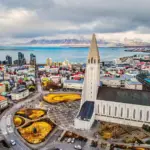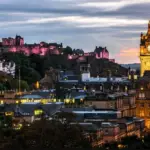
But where is Istanbul? Located in the heart of Eurasia, Istanbul is the only city in the world that spans two continents: Europe and Asia. Located on the shores of the Strait of Bosphorus, this charming city is a place where culture, history and gastronomy blend to create a unique experience.
Istanbul is an enigmatic city, where past and present meet at every corner. With a history dating back over 2,500 years, this city is home to some of the world's most iconic monuments. The Blue Mosque, Topkapi Palace, and Hagia Sophia are just some of the must-see tourist attractions when visiting the city.
Besides being a tourist destination Popular, Istanbul is a vibrant city with a bustling nightlife, bustling shops, and delicious cuisine. No matter what you're looking for, Istanbul has something for everyone.

Main conclusions
- Istanbul is the only city in the world that spans two continents.
- The city is rich in history and culture, with some of the most iconic monuments in the world.
- Istanbul is a tourist destination popular, with delicious cuisine and a lively nightlife.
Geographical location of Istanbul
Istanbul is the only city in the world located on two different continents—Europe and Asia—making it a truly special city. It's located in Turkey, a country bordering Greece, Bulgaria, Armenia, Georgia, Azerbaijan, Iran, Iraq, and Syria.
The city is bathed by the strait of Bosphorus, which separates the continents. The European part of Istanbul is located west of the Bosphorus, while the Asian part is to the east.
Istanbul's location between two different continents has greatly influenced the city's history, culture, and lifestyle. It is considered a bridge between East and West, making it a unique place full of contrasts.

Istanbul tourist attractions
Istanbul is a city rich in history and culture, with countless sights to explore. Here are some of the most famous:
| Name | Description |
|---|---|
| Blue Mosque | One of the most famous mosques in the world, the Blue Mosque owes its name to the tiles that line its interior. It is an icon of the city and an important place of worship. |
| Topkapi Palace | A former Ottoman palace, now home to a museum displaying historical artifacts and royal treasures, it is an important landmark of the city and a testament to the greatness of the Ottoman Empire. |
| Hagia Sophia | Originally built as a Christian church, Hagia Sophia was converted into a mosque in the 15th century, before becoming a museum. It is famous for its impressive architecture and its rich history. |
| Grand Bazaar | One of the largest covered markets in the world, the Grand Bazaar is a maze of shops and stalls selling everything from carpets and jewelry to spices and antiques. |
| Galata Tower | A historic observation tower offering incredible views of the city. Built in 1348, the Galata Tower is an iconic symbol of Istanbul. |
These are just some of the Istanbul tourist attractions, but there is much more to see and do in this fascinating city.
Culture and traditions of Istanbul
Istanbul is a city rich in culture and traditions, where East meets West, creating a unique blend of historical and contemporary influences.
Cuisine is a fundamental part of Istanbul's culture, with traditional dishes like kebab and baklava found in restaurants and markets throughout the city. Tourists can also sample traditional Turkish tea, served in small glass cups with sugar.
THE music and dance are another important part of Istanbul's culture, with traditional artists performing in local nightclubs. There's also a vibrant contemporary music scene, with many live music venues throughout the city. Music festivals are a popular event, with crowds gathering to enjoy jazz, rock, and Turkish folk music.
Additionally, there are celebrations and festivals throughout the year, such as the Istanbul International Film Festival, Istanbul Dance Festival, and Istanbul Book Festival, which offer a unique opportunity to experience the local culture.
Another important part of Istanbul's culture is religion, with the majority of Turks being Muslim. The city is home to several impressive mosques, including the famous Blue Mosque, an iconic landmark.
Visitors can also experience Turkish traditions, such as the traditional Turkish bath, known as a hammam, and the local market, where they can buy carpets, ceramics, and local crafts.
In short, Istanbul's culture and traditions are rich and diverse, reflecting the city's history and the influence of different cultures over the years. Tourists visiting Istanbul have the opportunity to experience the local culture in many different ways and discover all that this fascinating city has to offer.
History of Istanbul
THE history from Istanbul is a fascinating journey through time, from its founding as Byzantium around 660 BC to becoming the capital of the Roman, Byzantine, and Ottoman Empires. For centuries, this charming city was an important commercial and cultural center, attracting visitors from around the world.
During the Roman period, the city was known as Constantinople, named in honor of Emperor Constantine. During the reign of Emperor Justinian (527–565 AD), the Hagia Sophia was built, becoming an architectural landmark of the city.
In the 15th century, Istanbul became the capital of the Ottoman Empire and underwent a major transformation, with the construction of new mosques, palaces, and monuments. However, the city was also the scene of tragic events, such as the Massacre of Constantinople of 1453, which resulted in the fall of the Byzantine Empire.
In 1923, after the fall of the Ottoman Empire, the city was renamed Istanbul and became the capital of modern Türkiye.

Topkapi Palace
One of Istanbul's most important historical landmarks is Topkapi Palace, built in the 15th century and serving as the residence of the Ottoman sultans for over 400 years. Today, the palace is a museum housing an impressive collection of historical treasures, including jewelry, weapons, and sacred objects.
The Blue Mosque
Also known as the Sultan Ahmed Mosque, the Blue Mosque is a stunning example of Islamic architecture and one of Istanbul's most popular tourist attractions. Built in the 17th century, the mosque is decorated with blue and white ceramic tiles, lending the place an air of elegance and beauty.

Hagia Sophia
Originally built as a Christian church in the 6th century, Hagia Sophia became a mosque after the Ottoman conquest in 1453 and is now a museum. The Basilica's 56-meter-high dome is a stunning example of architectural engineering and a historic landmark of the city.
Cultural attractions in Istanbul
Istanbul is a city steeped in culture and history, which means there are many cultural attractions for visitors to enjoy. From museums and art galleries to cultural events popular, there is something for everyone.
One of the city's main cultural attractions is the Istanbul Museum of Modern Art, which houses an extensive collection of contemporary Turkish and international art. For history buffs, the Istanbul Archaeological Museum is a must-see, with exhibits dating from the prehistoric period to the end of the Ottoman Empire.
For those seeking a unique cultural experience, Istanbul hosts several popular events throughout the year. The Istanbul Jazz Festival, held annually in July, is one of the most anticipated events on the city's cultural calendar, while the Istanbul International Film Festival in April showcases an exciting mix of Turkish and international films.
Another cultural attraction in Istanbul is the classic Turkish dance show, which takes place at various venues throughout the city. A unique blend of belly dancing, traditional music, and extravagant costumes, the Turkish dance show is a true cultural experience.
Top cultural attractions in Istanbul:
| Attraction | Description |
|---|---|
| Istanbul Museum of Modern Art | Extensive collection of contemporary Turkish and international art. |
| Istanbul Archaeological Museum | Exhibitions of historical artifacts from the prehistoric period to the end of the Ottoman Empire. |
| Istanbul Jazz Festival | Annual jazz event in July, featuring Turkish and international artists. |
| Istanbul International Film Festival | Turkish and international film screenings in April. |
| Turkish Dance Show | Unique blend of belly dancing, traditional music and extravagant costumes. |
These are just a few of the many cultural attractions you can find in Istanbul, so be sure to explore everything the city has to offer during your visit.
Gastronomy in Istanbul
Istanbul's cuisine is a true experience for the senses, brimming with unique flavors and aromas that delight tourists from around the world. The city offers a rich culinary diversity, blending influences from Mediterranean, Arabic, and Persian cuisine.
The most popular dishes include the famous kebab, made with lamb or chicken and served with pita bread and salad. Another typical dish is borek, a type of pastry stuffed with cheese, meat, or vegetables.
Sweets are also a strong point of Istanbul's cuisine, with a highlight being the traditional baklava, made with puff pastry, nuts, and honey. Another popular dessert is kunefe, made with cheese, thin noodles, and sugar syrup.
In addition to traditional dishes, the city has wonderful food markets, such as the famous Grand Bazaar, where you can find spices, dried fruits, and Turkish sweets, as well as souvenirs.
Restaurants in Istanbul
Istanbul has a vibrant culinary scene, with many restaurants offering both traditional and modern dishes. The Beyoglu and Besiktas neighborhoods are known for their diverse dining options, ranging from fine dining to bistros and bars.
For a unique experience, visit one of the city's many hilltop restaurants, where you can enjoy panoramic views of the Bosphorus while savoring delicious dishes. Be sure to sample the fresh seafood at the waterfront restaurants in the Ortakoy neighborhood.
Nightlife in Istanbul
One of the wonders of Istanbul is its vibrant nightlife, offering visitors a variety of options for all tastes and styles. Whether you're looking to dance the night away or relax with a cocktail, there's always something to satisfy your nightlife cravings.
For those looking for a lively night of dancing, Istanbul's club scene is unparalleled. There are many nightclubs offering a mix of live music, DJs, and traditional rhythms, creating a unique and energizing atmosphere.
If you prefer a quieter, more intimate atmosphere, Istanbul also offers sophisticated bars and exclusive lounges where you can relax and enjoy a drink overlooking the Bosphorus.
At night, the city comes alive and night markets, such as the Spice Bazaar and the Grand Bazaar, open their doors to offer an experience One-stop shopping with a wide variety of Turkish and international products.
In short, the nightlife in Istanbul is rich and diverse, and there's certainly something for everyone. So, get dressed and get ready to enjoy the wonders of this exciting city!
Shopping in Istanbul
Istanbul is a shopper's paradise, with a variety of options ranging from traditional markets to modern malls. Turkish products are renowned for their quality and beauty, and you'll find many unique items to take home as souvenirs.

Bazaars
Istanbul's bazaars are world-renowned and offer a unique and authentic shopping experience. The Grand Bazaar is the most famous of all, with over 3,000 shops selling carpets, jewelry, ceramics, textiles, and more. The Spice Bazaar is another must-see, offering a wide variety of spices, teas, and Turkish sweets.
Shopping malls
If you prefer to shop in an air-conditioned environment, Istanbul has many modern malls. Istinye Park is one of the largest and most luxurious, with over 300 stores featuring international and local brands, as well as a multiplex cinema and a variety of dining options. Cevahir Mall is another popular mall, with over 200 stores and a large food court.
Street shops
Istanbul's streets are lined with clothing, shoe, bag, and accessory stores. The most popular shopping street is Istiklal Street, where you'll find large department stores, exclusive boutiques, and international brand stores. Other good options include Bagdat Street, in Istanbul's Asian area, and Nisantasi Street, known for its luxury shops and art galleries.
Craftsmanship
If you're interested in Turkish crafts, Istanbul is the place to find unique and authentic pieces. The Çukurcuma Ceramic Market is famous for its beautiful tiles, ceramics, and decorative objects. The Old Book Street in Beyazıt is another must-see, where you can find rare and antique books, as well as postcards and old maps.
General tips
- Prices at bazaars are usually negotiable, so don't hesitate to haggle to get a good deal.
- Stores are generally open from 9am to 8pm, Monday through Saturday.
- Don't forget to try the famous Turkish tea while you shop.
With so many options shopping in Istanbul, you're sure to find something that suits your tastes and budget.

Transportation in Istanbul
To get around Istanbul, there are several options. public transport available that cater well to tourists. One of the most popular options is the subway system, which connects different areas of the city.
In addition to the subway, there's also a good bus network that runs throughout the city. For those who prefer a quicker option, taxis are quite affordable and offer reasonable prices for short trips.
Another popular transportation option that offers unique views of the city is the iconic Bosphorus ferry. Several ferry lines cross the strait, offering a great way to appreciate the city's beauty from a different perspective.
For those who enjoy exploring the city on two wheels, there are bike rental options available at various locations. Istanbul also boasts numerous bike paths and excellent cycling infrastructure.
Finally, for those who prefer more private transportation, car rental options are available throughout the city. However, it's important to remember that traffic in Istanbul can be quite intense and chaotic, especially during rush hour.
Tips for visiting Istanbul
Istanbul is a fascinating city with a rich history, culture, gastronomy, and diverse tourist attractions. If you're planning a visit, here are some helpful tips to make your trip even more enjoyable.
Best time to visit
The best time to visit Istanbul is during spring (March to May) or autumn (September to November), when the weather is mild and the tourist crowds are thinner. In summer, temperatures can be quite high, and the city is packed with tourists.
Visa information
If you're a Brazilian tourist, you'll need a visa to visit Turkey. You can apply online before your trip or purchase one upon arrival at Istanbul airport. Check specific visa requirements in advance to avoid problems upon arrival.
Hosting
Istanbul offers a wide range of accommodation options, from luxury hotels to budget hostels. Most hotels are concentrated in the Sultanahmet and Beyoglu neighborhoods, which are central areas and close to popular tourist attractions. Book in advance to secure the best rates.
Extra tips
- Experience local cuisine in small taverns and local restaurants, which offer authentic and delicious dishes at affordable prices.
- Don't miss Istanbul's Grand Bazaar, which offers a unique shopping experience. Remember to bargain!
- Learn some basic Turkish words, like “merhaba” (hello) and “teşekkür ederim” (thank you), to make communicating with locals easier.
By following these tips, you'll be ready to make the most of your trip to Istanbul, a city vibrant and full of history and culture.
Conclusion
In short, Istanbul is a unique and fascinating city that unites East and West on the shores of the Bosphorus. Its geographic location has influenced its culture, history, and architecture, resulting in a unique blend of traditions and styles.
The city is packed with must-see attractions, such as the Blue Mosque, Topkapi Palace, and Hagia Sophia. Furthermore, the rich cuisine, lively nightlife, shopping opportunities, and cultural attractions make Istanbul a complete destination for any traveler.
When visiting Istanbul, it's important to pay attention to useful tips, such as the best time to travel and transportation options. In short, Istanbul is definitely a place worth exploring and appreciating its beauty and uniqueness. So, if you haven't yet visited this enchanting city, don't waste any more time and be enchanted by everything Istanbul has to offer!

FAQ
Where is Istanbul?
Istanbul is located between East and West, on the shores of the Bosphorus Strait, which separates Europe from Asia.
What is the geographical location of Istanbul?
Istanbul is strategically positioned at the junction between Europe and Asia, making it a transcontinental city.
What are the main tourist attractions in Istanbul?
Some of Istanbul's most famous landmarks include the Blue Mosque, Topkapi Palace, and Hagia Sophia.
What are the main cultural characteristics and traditions of Istanbul?
Istanbul's culture is rich and diverse, with highlights including the region's cuisine, music, dance, and festivals.
What is the history of Istanbul?
THE history of Istanbul dates back to its founding as Byzantium, through its transformation into the capital of the Roman, Byzantine and Ottoman Empires.
What are the main cultural attractions in Istanbul?
In Istanbul, you'll find museums, theaters, art galleries, and cultural events that reflect the city's cultural richness.
What is the cuisine like in Istanbul?
Istanbul's cuisine is delicious and diverse, with traditional dishes like kebab and baklava, as well as lively food markets.
What is the nightlife like in Istanbul?
Istanbul's nightlife is lively, with nightclubs, bars and restaurants offering entertainment until late at night.
What can I buy in Istanbul?
In Istanbul, you'll find a variety of shopping opportunities, from the famous bazaars to street shops and modern malls.
What are the transportation options in Istanbul?
In Istanbul, you can use the metro system, buses, taxis and even take advantage of sea transport through the Bosphorus Strait.
What tips do you have for anyone wanting to visit Istanbul?
Some helpful tips for those planning to visit Istanbul include choosing the best time to travel, visa information, and accommodation suggestions.
Lucas Wanderlust has a tireless spirit of adventure, always seeking new travel experiences. Fascinated by the world and the possibility of exploring unknown destinations, he fell in love with the sense of freedom and self-discovery that traveling alone provides. With a backpack on his back and a heart open to the unknown, Lucas embarks on exciting journeys, where each destination becomes a unique chapter in his life story. He gives himself body and soul to the magic of solo travel, inspiring others to follow in his footsteps and discover themselves through adventure.







